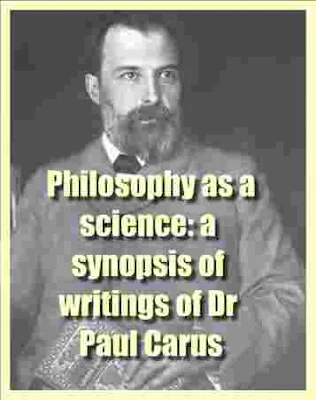Philosophy as a science: a synopsis of writings of Dr Paul Carus
 |
| Paul Carus |
containing an introduction written by himself, summaries of his books, and a list of articles to date
Carus was born in Ilsenburg, Germany, and educated at the universities of Strassburg (then Germany, now France) and Tübingen, Germany. After obtaining his PhD from Tübingen in 1876 he served in the army and then taught school. He had been raised in a pious and orthodox Protestant home, but gradually moved away from this tradition
The aim of all my writings centres on Philosophy the endeavour to build up a sound and objective tenable philosophy, one that would be as science, objective as any branch of the natural sciences. I do not want to propound a new philosophy of my own but to help in working out philosophy itself, viz., philosophy as a science; and after many years of labour in this field, I have come to the conclusion, not only that it is possible, but also that such a conception of the world is actually preparing itself in the minds of men.
The old philosophies are constructions of purely subjective significance, while agnosticism, tired of these vain efforts and lacking the strength to furnish a better solution of the problem, claims that the main tasks of philosophy cannot be accomplished; but if science exists, there ought to be also a philosophy of science, for there must be a reason for the reliability of knowledge.
Every success of scientific inquiry, every Agnosticism progress of research in the several fields a failure. of knowledge, every new invention based upon methodical experiment, is a refutation of agnosticism —the philosophy of nescience — in so far as these several advances corroborate the reliability of science.
CONTENTS
Foreword
Introduction 1-28
Age of Science i
Science and Scientific Methods 2
Form and the Philosophy of Form 5
The Scope of Philosophy 7
The Philosophy of the Future 8
No Things-in-Themselves 10
Causality, The Law of Transformation 11
The Importance of Psychology 12
The Doctrine of Parallelism 14
Organization and Memory 16
Memory, the Soul Builder 19
The Immortality Problem 21
Seamless and Mysticism 22
The Philosophy of Pure Form 24
Religion and Art 25
Summaries of Books 29-93
Philosophy and Psychology 29-44
Monism and Meliorism 29
Fundamental Problems 29
Three Philosophical Pamphlets 31
Primer of Philosophy 31
Kant's Prolegomena to Any Future Metaphysic. . . 32
Kant and Spencer 33
The Surd of Metaphysics 34
The Soul of Man 37
The Foundations of Mathematics 40
Whence and Whither? 43
Ethics and Religion 44-57
The Ethical Problem 44
The Nature of the State 46
Our Children 47
The Rise of Man 49
Homilies of Science 50
The Dawn of a New Religious Era and Other Essays 52
The Religion of Science 53
The Idea of Good 54
God: An Enquiry and a Solution 55
History of Religion 57-64
The History of the Devil 57
The Story of Samson 59
The Bride of Christ 61
German Literature 65-68
Angelus Silesius 65
Edward's Dream 66
Goethe and Schiller's Xenions 66
Friedrich Schiller 67
Goethe, His Philosophy and Art ^
Buddhism 68-77
The Dharma 68
The Gospel of Buddha 69
Buddhism and Its Christian Critics 71
Portfolio of Buddhist Art, Historical and Modern. 73
Stories of Buddhism
Stories of Buddhism
(a) Karma 77
Karma, eine buddhistische Erzahlung. German edition 74
(b) Nirvana 75
(c) Amitabha 76
Chinese Subjects 77-87
Chinese Philosophy -j-j
Chinese Thought 79
Lao-Tze's Tao Teh King 81
The Canon of Reason and Virtue 81
T'ai-Shang Kan-Ying P'ien 83
Yin Chih Wen 84
Chinese Life and Customs 85
Poetry and Fiction 87-92
De Rerum Natura 87
Godward 88
Sacred Tunes for the Consecration of Life 88
The Crown of Thorns 89
Eros and Psyche 89
The Chief's Daughter 91
The Philosopher's Martyrdom 92
Summaries of Editorial Articles 93-187
Publisher's Note 187
Index 189
Download 4.5 MB

